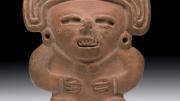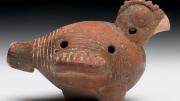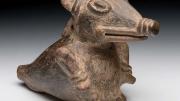Inside one glass case sits a little round owl, its eyes staring straight ahead, its clay wings almost fluffy. Next to it stand what looks like a falcon, and a pair of monkeys with O-shaped mouths. Inches away, an alligator, an armadillo, and a flat-bodied frog. A smiling, seated man wears a hat and a heavy necklace. There are shells and fish and lizards and a squat chicken—and stranger figurines too: a dog riding on the back of a cow, and a creature that looks half-anteater, half-pig.
“Each of these is a story and a sound,” says Davíd Carrasco, the Divinity School’s Rudenstine professor for the study of Latin America, who also teaches in the department of anthropology. The objects, some as small as a coach’s whistle, others as large as a grapefruit, are ocarinas, Mesoamerican flute-like instruments dating back as far as 4,500 years, now on display at the Peabody Museum of Archaeology and Ethnology. Once thought to be toys, ocarinas are, Carrasco explains, complicated musical instruments—some have multiple chambers and can sound more than a dozen notes—that played an important role in pre-Columbian religious rituals and domestic life. (Large enough to cover its player’s face like a mask, the ocarina above was probably used for parades.)
They offer a glimpse, he adds, into ancient Mesoamerican beliefs: for instance, that human and animal spirits could inhabit each other’s bodies. “Some of these animals—they’ve been turned into a musical instrument, but it can only be played by a human. So the human breath possesses the animal.”
The instruments in the Peabody exhibit, Ocarinas of the Americas: Music Made in Clay, were rediscovered in the museum’s vaults a few years ago after a campus performance by musician and Latin American scholar José Cuellar (a San Francisco State professor emeritus also known as saxophonist Dr. Loco of the Rockin’ Jalapeño Band). A curator recognized one of the instruments Cuellar played that day as an ocarina just like the hundreds boxed up in the basement. She told Cuellar about them, and when he returned to Harvard in 2012 as a Peabody Museum Hrdy Fellow, he opened up the ocarina boxes. “He laid them all out for the staff and played them, one after another, finding the tones, testing the ranges, ” Carrasco recalls. “It was a beautiful afternoon. People heard these instruments that had not made sounds for perhaps 1,000 years. He brought them back to life.”











